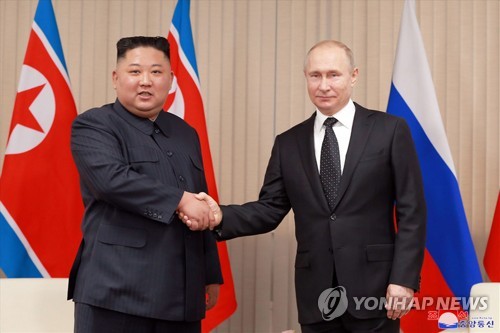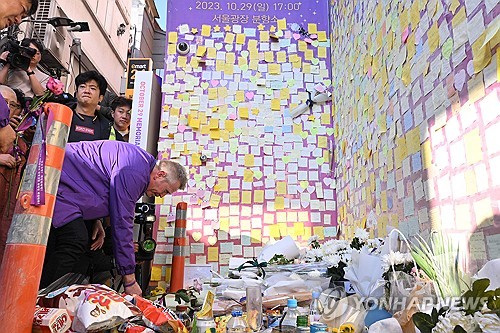(3rd LD) N.K. fires off 2 Rodong missiles, one explodes shortly after launch: military
(ATTN: RECASTS headline, lead; UPDATES with more info throughout)
SEOUL, Aug. 3 (Yonhap) -- North Korea on Wednesday fired off what are believed to be two mid-range Rodong ballistic missiles, but one of them exploded right after launch, the South Korean military said.
The missiles were launched from near the southwestern county of Eunyul at 7:50 a.m., South Korea's Joint Chiefs of Staff (JCS) said, adding the other one is presumed to have flown about 1,000 kilometers before falling into waters off North Korea's east coast.
"The North test-fired two ballistic missiles earlier in the day, but one of them exploded," the JCS said.
The South Korean military said that North Korea demonstrated its blatant ambition to target South Korea and neighboring countries by launching a missile that may be able to carry a nuclear warhead down the road.
Japan's defense minister told reporters earlier in the day that the North's missile appeared to have fallen in the island nation's economic exclusive zone (EEZ), some 250 km west of Akita Prefecture in northeastern Japan.
It marked the first time that a North Korean missile fell in Japan's EEZ, an indication that the communist country is testing the capacity of its Rodong missile that has a maximum range of some 1,300 km.
The South Korean military estimated that with the latest launch, the North is trying to show off its missile capabilities to target and hit even its neighboring countries.
On July 19, the North fired off two Rodong missiles and a shorter-range Scud missile in defiance of Seoul's move to deploy an advanced U.S. missile defense system.
In July, South Korea and the United States decided to deploy the Terminal High Altitude Area Defense (THAAD) system in the southern county of Seongju by end-2017 in a bid to counter North Korea's evolving nuclear and missile threats. The county is located about 296 kilometers southeast of Seoul.
As an integral part of the U.S.-led missile-defense system, THAAD is designed to shoot down a ballistic missile at altitudes of 40 to 150 km in its terminal phase of flight using a hit-to-kill method.
In response to Seoul's decision to deploy a THAAD battery, North Korea warned last month that it will take "physical counter-action" to counter the anti-missile shield.
The North's provocation also came one day before the first anniversary of a land mine explosion near the inter-Korean border blamed on North Korea. The incident seriously injured two South Korean soldiers.
North Korea is banned from developing ballistic missile technology under relevant United Nations Security Council (UNSC) resolutions. The USNC slapped its toughest sanctions on North Korea over its fourth nuclear test in January and long-range rocket launch in the following month.
North Korea has ceaselessly developed its nuclear weapons and missiles in defiance of international condemnation. The North has fired off ballistic missiles while claiming that it had succeeded in developing a nuclear warhead small enough to be put on a missile.
It also claimed the successful launch of the Musudan intermediate-range ballistic missile in June, saying that it has the capacity to strike U.S. forces in the Pacific region.
Since North Korean leader Kim Jong-un took office in late 2011, North Korea is believed to have test-fired 32 ballistic missiles including six Musudan missiles and six Rodong missiles so far, according to Seoul's military.
The Musudan missile, with an estimated range of some 3,000 to 4,000 kilometers, could theoretically reach any target in Japan and fly as far as the U.S. territory of Guam. The Scud missile has a range of about 300 to 1,000 km.
South Korea's unification ministry strongly condemned North Korea for making the latest provocation, calling for an immediate halt to its missile launches.
"North Korea's act constitutes a clear violation of the relevant UNSC resolutions. The missile launch is a grave provocation to South Korea and the international community," Jeong Joon-hee, ministry spokesman, told a regular press briefing. "North Korea should immediately suspend its provocations and focus on improving the lives of its people."
He added that Pyongyang seems to be flexing its muscles and trying to drive a wedge among South Koreans over the issue of the THAAD deployment.
The South Korean military said that it will react resolutely to North Korea's provocations that threaten the country's security.
Local military analysts said that North Korea may declare a no-sail zone in waters off its east and west coasts for additional missile launches as South Korea and the United States gear up for the Ulchi Freedom Guardian joint exercise later in the month.
sooyeon@yna.co.kr
(END)
-
 BTS' RM to prerelease a track of 2nd solo album
BTS' RM to prerelease a track of 2nd solo album -
 BTS' Jungkook's 'Seven' chosen as hottest hit outside U.S.
BTS' Jungkook's 'Seven' chosen as hottest hit outside U.S. -
 'Queen of Tears' weaves rich tapestry of Korean contemporary art
'Queen of Tears' weaves rich tapestry of Korean contemporary art -
 From pastime to academic discipline: Exhibition spotlights evolution of Korean embroidery
From pastime to academic discipline: Exhibition spotlights evolution of Korean embroidery -
 Indonesia coach left with mixed feelings after eliminating native S. Korea in Olympic football qualifiers
Indonesia coach left with mixed feelings after eliminating native S. Korea in Olympic football qualifiers
-
 'Queen of Tears' weaves rich tapestry of Korean contemporary art
'Queen of Tears' weaves rich tapestry of Korean contemporary art -
 From pastime to academic discipline: Exhibition spotlights evolution of Korean embroidery
From pastime to academic discipline: Exhibition spotlights evolution of Korean embroidery -
 BTS' RM to prerelease a track of 2nd solo album
BTS' RM to prerelease a track of 2nd solo album -
 BTS' Jungkook's 'Seven' chosen as hottest hit outside U.S.
BTS' Jungkook's 'Seven' chosen as hottest hit outside U.S. -
 N. Korea touts ties with Russia on Kim-Putin summit anniversary
N. Korea touts ties with Russia on Kim-Putin summit anniversary
-
 Trump suggests U.S. could withdraw its troops if S. Korea does not contribute more to support USFK: TIME
Trump suggests U.S. could withdraw its troops if S. Korea does not contribute more to support USFK: TIME -
 BTS' Jungkook's 'Seven' chosen as hottest hit outside U.S.
BTS' Jungkook's 'Seven' chosen as hottest hit outside U.S. -
 N. Korea becoming 'more confident' due to its ties with Russia: Pentagon chief
N. Korea becoming 'more confident' due to its ties with Russia: Pentagon chief -
 S. Korea, Australia to hold 2+2 talks of defense, foreign ministers
S. Korea, Australia to hold 2+2 talks of defense, foreign ministers -
 (LEAD) S. Korea discussed possible participation in AUKUS Pillar 2 with Australia: defense minister
(LEAD) S. Korea discussed possible participation in AUKUS Pillar 2 with Australia: defense minister



















